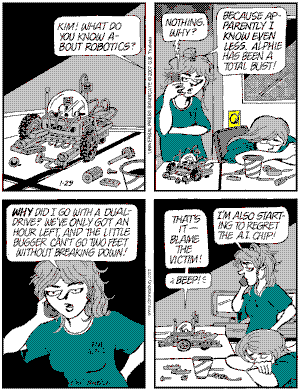"At times, bullshit can only be
countered with superior bullshit."
-- Norman Mailer
"It may be that universal history is the
history of the different intonations
given a handful of metaphors."
-- Jorge Luis Borges (1951),
"The Fearful Sphere of Pascal,"
in Labyrinths, New Directions, 1962
structural blending, it is good to be clear about their philosophical
orientation. The reason for taking special care with this is that, in
Western culture, mathematical formalisms are often given a status
beyond what they deserve. For example, Euclid wrote, 'The laws of nature are but the mathematical thoughts of God.'"
-- Joseph A. Goguen, "Ontology, Society, and Ontotheology" (pdf)
Goguen does not give a source for this alleged "thoughts of God" statement.
A Web search for the source leads only to A Mathematical Journey, by Stanley Gudder, who apparently also attributes the saying to Euclid.
Neither Goguen nor Gudder seems to have had any interest in the accuracy of the Euclid attribution.
Talk of "nature" and "God" seems unlikely from Euclid, a pre-Christian
Greek whose pure mathematics has (as G. H. Hardy might be happy to point
out) little to do with either.
Loose talk about God's thoughts has also been attributed to Kepler and Einstein... and we all know about Stephen Hawking.
Gudder may have been misquoting some other author's blather about Kepler. Another possible source of the "thoughts of God" phrase is Hans Christian Oersted. The following is from Oersted's The Soul in Nature--
"Sophia. Nothing of importance; though indeed I
had one question on my lips when the conversion took the last turn. When
you alluded to the idea, that the Reason manifested in Nature is
infallible, while ours is fallible, should you not rather have said, that
our Reason accords with that of Nature, as that in the voice of Nature
with ours?
Alfred. Each of these interpretations may be
justified by the idea to which it applies, whether we start from ourselves
or external nature. There are yet other ways of expressing it; for
instance, the laws of Nature are the thoughts of Nature.
Sophia. Then these thoughts of Nature are also
thoughts of God.
Alfred. Undoubtedly so, but however valuable the
expression may be, I would rather that we should not make use of it till
we are convinced that our investigation leads to a view of Nature, which
is also the contemplation of God. We shall then feel justified by a
different and more perfect knowledge to call the thoughts of Nature those
of God; I therefore beg you will not proceed to [sic] fast."
Oersted also allegedly said that "The
Universe is a manifestation of an Infinite Reason and the laws of
Nature are the thoughts of God." This remark was found (via Google book search) in an obscure journal that does not
give a precise source for the words it attributes to Oersted.












Recent Comments